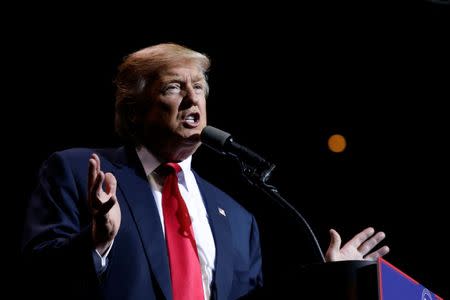Trump could privatize nation's air traffic controllers

By Ginger Gibson WASHINGTON (Reuters) - The chances that the federal government could hand off the U.S. air traffic control system to private management are increasing, say advocates who report they are getting supportive feedback from President-elect Donald Trump and his team. U.S. Rep. Bill Shuster, who chairs the House of Representatives Transportation Committee, has met with Trump and incoming Transportation Secretary Elaine Chao to make his case for moving the nation's 14,500 air traffic controllers and their mission out of government control and into a non-profit organization. Shuster and other privatization advocates argue that spinning off air traffic control into a non-government entity would allow for a more efficient system and rapid, cost-effective improvements of technology, in part by avoiding the government procurement process. The National Air Traffic Controllers Association, the union that represents controllers, came out in favor of Shuster's legislation earlier this year. But he has run into bipartisan opposition in both the House and the Senate and push back from some of the nation's airlines. Opponents say the U.S. system is so large that privatization would not save money, would drive up ticket costs and could create a national security risk. The landscape might change once Trump, who campaigned on improving the nation's infrastructure, occupies the White House on Jan. 20. Apart from Shuster, officials and lobbyists who work in infrastructure construction say the idea of privatize air traffic controllers as part of an infrastructure bill is gaining steam, especially among those who are concerned that Congress will not be able to pass a separate sweeping transportation bill. Congress has been averse to spending money, but privatizing air traffic control systems would shift the cost of upgrades from tax coffers to air travelers, the kind of move that makes lawmakers view it as free instead of an increase in federal spending. “I’ve had some conversations with Trump transition folks and they seemed very interested in putting this in their larger infrastructure bill,” Shuster said. EXPENSIVE UPGRADES The air traffic control system is in need of expensive upgrades, including the multi-billion dollar implementation of “NextGen,” a system that would utilize GPS to direct aircraft instead of the outdated use of radar. In Shuster's vision, the move would not enrich any particular company as air traffic control would be overseen by a nonprofit that reinvest any profits back into infrastructure improvements. Shuster first broached the subject with Trump two years ago, he said, and the two have discussed it several additional times. He met with Chao last week. It could take a strong presidential push for the privatization effort. Earlier this year, it failed to get even enough support from Republican members for a vote on the House floor. In February, Delta released a study arguing that privatization would cost air travelers more and would not achieve any savings. Many air traffic controller operations are funded through ticket taxes - which are levied on every flight. Historically, those taxes have been kept low by the government’s aversion to raising rates. But should the ticket tax become the control of an outside board, opponents are concerned that could drive up ticket prices. (Reporting by Ginger Gibson; Editing by Linda Stern and Alistair Bell)

 Yahoo Finance
Yahoo Finance 